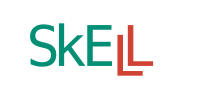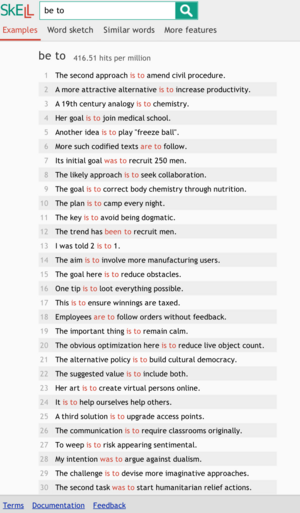SkELL
 | |
 Example sentences for the English phrase "be to" in SkELL | |
| Original author(s) | Vít Baisa, Vít Suchomel |
|---|---|
| Developer(s) | Lexical Computing Ltd. |
| Initial release | November 2014 |
| Stable release | 1.0.3
/ 2020-11-03 |
| Written in | GO, Riot.js |
| Engine | |
| Available in | English, Russian, German, Italian, Czech, Estonian |
| Type | Language learning |
| License | freeware |
| Website | skell |
![]() Search SkELL on Amazon.
Search SkELL on Amazon.
SkELL (abbreviation of Sketch Engine for Language Learning) is a free corpus-based web tool that allows language learners and teachers find authentic sentences for specific target words.[1] For any word or a phrase, SkELL displays a concordance that lists example sentences drawn from a special text corpus[2] crawled from the World Wide Web, which has been cleaned of spam and includes only high-quality texts covering everyday, standard, formal, and professional language.[1] There are versions of SkELL for English, Russian, German, Italian, Czech and Estonian.
SkELL is based on the commercial Sketch Engine corpus manager and the proprietary GDEX (Good Dictionary Examples) score that it implements.[1][3]
Features[edit]
SkELL can provide three kinds of results for a query:
- Examples: This page displays a concordance created by searching for the specified word or phrase in the reference corpus, taking any derived forms into account.
- Word sketch: This page shows the most frequent collocates for the specified word. It is a simplified version of Sketch Engine's word sketch function.
- Similar words: This page contains visualization of similar (not necessarily just synonymous) words in a word cloud, based on Sketch Engine's distributional thesaurus.
The number of displayed lines in a concordance is limited to 40. However, the frequency of the searched query in the reference corpus is indicated above the concordance as hits per million.
Use[edit]
It has been suggested that SkELL can be used, for instance:[4][5]
- to obtain illustrative examples of target features, lexical and grammatical;
- to find authentic sentences for the target word(s);
- to help students understand the meaning and/or usage of a word or phrase;
- to help teachers wanting to use example sentences in a class;
- to discover and explore collocates;
- to create gap-fill exercises;
- to have the students find and investigate examples/collocates;
- to draw sentences to be used for translation exercises;
- to teach various kinds of homonyms and polysemous words;
Data[edit]
For each language, SkELL uses a dedicated text corpus, which can also be searched manually in the Sketch Engine using more powerful tools.
For example, the English Corpus for SkELL includes a total of more than 57 million sentences that contain more than one billion words.[6] It is based on the English Wikipedia (a special selection of 130,000 articles), a subset from the English web corpus enTenTen14, the whole of the British National Corpus, and free news sources.[6] The English collection of Project Gutenberg used to be a part of the corpus as well, but was removed due to its too archaic language.[1][6]
History[edit]
SkELL was first presented in 2014, when only English was supported.[1] In 2015, support for Russian was added,[7] and Czech has been supported since 2017.[8] German,[9] Italian[10] and Estonian[11] were added in 2018.
References[edit]
- ↑ 1.0 1.1 1.2 1.3 1.4 Baisa, Vít; Suchomel, Vít (2014). "SkELL:Web Interface for English Language Learning" (PDF). Eighth Workshop on Recent Advances in Slavonic Natural Language Processing. NLP Consulting: 63–70.
- ↑ Thomas, James (14 June 2015). "Discovering English with SketchEngine – James Thomas interview". EFL NOTES. Retrieved 21 December 2015.
- ↑ Kilgarriff, A.; Husák, M.; McAdam, K.; Rundell, M.; Rychlý, P. (July 2008). "GDEX: Automatically finding good dictionary examples in a corpus". Proceedings of the XIII EURALEX International Congress. EURALEX: 425–432.
- ↑ Brown, Michael H. (2016-04-07). "SkELL: Easy to use for teachers and students". Corpus Linguistics 4 EFL. Retrieved 2018-12-03.
- ↑ Brown, Michael H. (2016-04-19). "SkELL: Homonymy and Polysemy". Corpus Linguistics 4 EFL. Retrieved 2018-12-03.
- ↑ 6.0 6.1 6.2 "English corpus for SkELL | Sketch Engine". www.sketchengine.eu. Retrieved 2018-12-03.
- ↑ Valentina, A., Vitalevna, B. O., Малолетняя, А. П., Olga, K., & Vit, B. (2016). RuSkELL: Online Language Learning Tool for Russian Language. In Proceedings of the XVII EURALEX International Congress. Lexicography and Linguistic Diversity (6–10 September 2016) (pp. 292-300). Ivane Javakhishvili Tbilisi State University.
- ↑ Cukr, Michal (2017). Český korpus příkladových vět (Czech corpus of example sentences) (Master's thesis) (in čeština). Brno: Masaryk University, Faculty of Arts. Retrieved 2017-06-22.
- ↑ "deSkELL – German corpus for SkELL | Sketch Engine". www.sketchengine.eu. Retrieved 2018-12-03.
- ↑ "itSkELL – Italian corpus for SkELL | Sketch Engine". www.sketchengine.eu. Retrieved 2018-12-03.
- ↑ "etSkELL – Estonian corpus for SkELL | Sketch Engine". www.sketchengine.eu. Retrieved 2018-12-03.
External links[edit]
This article "SkELL" is from Wikipedia. The list of its authors can be seen in its historical and/or the page Edithistory:SkELL. Articles copied from Draft Namespace on Wikipedia could be seen on the Draft Namespace of Wikipedia and not main one.
